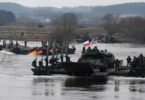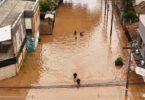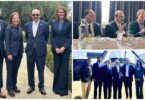F.P. Report
BRUSSELS: High Representative/Vice-President Josep Borrell has said that I am really happy to be in Tirana today with you and your government.
Albania is my second stop on my trip to the Western Balkans. Let me start by thanking Prime Minister Edi Rama, with whom I had interesting and good discussions, and I am also looking forward to have the opportunity to meet with the Minister for Europe and Foreign Affairs [Olta Xhaçka] , the Minister of Interior [Bledi Çuçi] and Deputy Minister of Defence [Dallëndyshe Bici] later today. And also, with the civil society, to have exchanges with representatives of the people, the civil society of this country who play such an important role for the country’s democracy and [the] country’s vibrant society.
Everybody knows, and the Prime Minister has been repeating, and I agree with him, that this is a critical moment for us, for the Europeans, [in] the broader sense of the word, which certainly includes the Western Balkans, and certainly Albania. It is a critical moment, and it is more needed than ever to meet and to discuss with one of our closest allies and partners. That’s awful – but everybody is watching through the TV channels – how the Russian leadership continues to indiscriminately attack Ukraine and its citizens. It is not just a war, in the military sense of the word, it is an attack against the population of Ukraine, its cities, civilians, including women, children, schools and hospitals. The Russian armed forces are causing death, desperation and massive damage. Everybody can witness that through their TVs at home. They can also watch the brave resistance of the Ukrainian people who continue supporting their armed forces defending the country. We continue our vast support to Ukraine, to the Ukrainian people. It will continue. In spite of the Russian attacks and threats, this support will continue.
It has been a brutal aggression from Russia to its neighbour. And in response to this brutal aggression against Ukraine and its people, we have adopted today – Prime Minister, I was talking about that with you – a new and fourth package of restrictive measures – what we call colloquially “sanctions” – to further contribute to ramping up our economic pressure on the Kremlin and cripple its logistical bases and its ability to finance the invasion of Ukraine.
The measures that we are taking will affect Russia’s trade, market access, membership in international financial organisations, crypto-assets, exports of goods and targeting critical economic sectors of the economy as steel and energy. And we are listing still more individuals, there is already more than 800, and more companies that are playing an active role in supporting the people, the “clique” around Putin, who are undermining Ukraine’s sovereignty, from the Russian government.
This is another major blow to the economic and logistic bases upon which Putin is building the invasion and taking the resources to finance it.
Needless to repeat, because we have said that many times, that this aggression is an en masse violation of international law and principles and a threat to the security and the stability in Europe.
I know that today Albania is appearing as a [one of the] most reliable partners of the European Union and globally. Albania was already aligned 100% with the European Union Common Security and Foreign Policy before the war and in these testing times, Albania has re-confirmed its engagement and commitment to the international security.
I want more particularly to thank Albania for its work globally in the international arena. As a member of the United Nations Security Council, Albania was a penholder of the United Nations Security Council resolution and co-sponsored the United Nations General Assembly resolution against Russian aggression that resulted with a strong condemnation and isolation of Russia in the international community.
Albania is a member of NATO, it is a NATO ally, but beyond that, it is also a security provider: I am very much grateful to Albania for their contributions to our CSDP [Common Security and Defence Policy] missions, our military missions, around the world. It is an important contribution that was taking place much before the war and I hope it will continue and increase.
We will also continue and increase our cooperation on cyber security, to fight against disinformation – [it is] very much needed. And I am proposing to allocate resources to enhance security and defence in the region.
We are living in a moment in which the stability and unity is more important than ever. And it is high time to reinvigorate the enlargement process. I know that you have heard that several times before, and you especially Prime Minister have been saying once and again that you do not need more declarations, but more actions. That is true. But it is also true that it is high time to reinvigorate this process and integrate the Western Balkans in an irreversible manner into the European Union.
Albania met all the conditions for opening the accession negotiations and I strongly support, work, engage, contribute to the start of the accession [talks] during the French Presidency. It is not an undetermined date but it is a time horizon. What I am saying for Albania, should also be true for North Macedonia.
Believe me, Prime Minister, we are engaged more than ever. My fellow colleague Commissioner Oliver [Várhelyi] in charge of the accession process, is devoting all his efforts to that. Me too. From the broader prospects of the regional stability and foreign policy, all institutions have taken clear understanding of the importance than today more than ever, represents the unity of the Europeans and the integration of the Western Balkans. For this part, this has to be fulfilled in a time horizon as much concrete as the time of the French Presidency. Certainly, I cannot make it something that engages me personally because it is not up to me, but up to the European institutions as a whole, but we are working as much as we can in order to overcome the latest difficulty for that becoming a reality.
I have also to praise you, Prime Minister, for the speed of your reforms, especially in the field of justice reform to support the Rule of Law, there have been very much significant and need to continue because these reforms supporting [the] green economy, supporting [the] digital transformation, will ensure rapid advancement when negotiations are launched.
Let us go – if you allow me – to something closer to the everyday life of the citizens. I know that you have been facing strong concerns in the minds of the people about growing prices. It is not just in Albania. The war has created [inaudible – audio was cut] in the world economy.
It is not a consequence of being aligned with the sanctions. Many states that have not aligned with the sanctions at all, are suffering exactly the same process of price increases. The price increase in electricity, in oil, in gas, also in food, which is the consequence of the dependence of all of us, from the world economy integrated, of our mutual interdependence that is now becoming a weapon, because Russia is using it as a weapon. It is not a matter of just Albania or consequence of sanctions. It is the consequence of war. The consequence of the stop of exports, the consequence of price increase in products which affects all of us here in Europe, in the Western Balkans, in North Africa, in Sahel, everywhere.
Allow me to put an example. I was paying my electricity bill at home in Spain, at 50€/mW/h and now it is about 500€/mW/h. This is something that happens in the whole Europe. Electricity prices have been increasing by, at least, 6 times. The oil for my car in Brussels, it is more than €2 by litre – 20% increase. I can say the same thing about food, and I am sorry to say it is going to be a phenomenon that will affect poor countries in the world much more than us, because they are very much dependent of the wheat being produced in Russia, who has just stopped the exports. It will create a wave shock in the world economy, and the only way of facing that is becoming united and putting in place a strategy that allows us to support each other.
And I take good note of your request that any answer to this economic crisis should include the Western Balkans, because we are facing a third asymmetric shock in the European economy. First, it was the euro crisis in 2008, asymmetric, it affected the countries in the South. The second one was the pandemic, asymmetric, it was affecting more countries than others. This is also asymmetric because look at the Eastern borders of Europe. Poland has been receiving today so many refugees that it has become the country in Europe with the highest proportion of foreign nationals, in a couple of weeks.
Things have changed quickly. We have been hosting, in the European Union Member States, more than 2 million people. Putin’s purpose is to destroy Ukraine and to empty Ukraine, pushing their people to escape. 2.5 million today, how many tomorrow, or the day after tomorrow? If the bombing continues, if the population starves? You can live for a while without heating, but not so long without water. And that is what is happening in Mariupol and in many other cities in Ukraine.
The Russian army is unable to conquer, so they stop, they encircle, and they do what they know to do very well: bombing, destroying. They did that in Syria. Remember the pictures of Aleppo. They did that in Chechnya, remember Grozny. And they are doing the same thing in Ukraine. This is going to be the biggest humanitarian crisis as the United Nations Secretary General said yesterday.
So, on this occasion, we have to do three things: to isolate Russia from the international community, to put the heavy cost of our economic sanctions on it and support the Ukrainian people. And support the people that are supporting us in this endeavour – and Albania is one of them. One of the most important partners, clearly determined to have a strong stance defending international law, territorial integrity, and human rights.
Finally, Prime Minister, you talk about the [Economic and] Investment Plan, that has mobilised – and will continue mobilising – unprecedented resources to support diversification of energy supply, reducing dependence, strengthening regional cooperation, building infrastructures, and creating jobs. And I take good note of your will that these specific infrastructures that can help a lot to unlock Albania and to integrate it in this physical space of the region will be given the attention that you are asking for and I am sure it will have.
It is this kind of initiative that can address the economic development of the region. To face the consequences of the war, to face future shocks and allow, also, to focus on the economic recovery that can be very much affected by these unhappy events. This is also the moment to show solidarity by all means, from energy-saving to resource-sharing.
I am very happy to be here with you, Prime Minister, and to share these thoughts, which will guide our actions.






